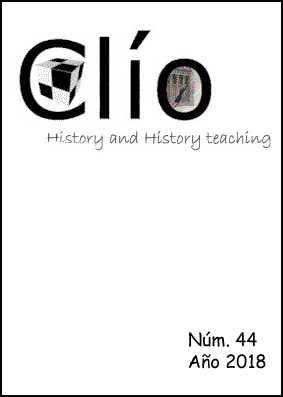The Discovery of America? Representations of Columbus and Indigenous Peoples in Spanish Textbooks
DOI:
https://doi.org/10.26754/ojs_clio/clio.2018448674Keywords:
Discovery of America, Columbus, indigenous peoples, Eurocentrism, textbook, 2º ESOAbstract
This paper analyzes how five Spanish textbooks used in 2º ESO teach Columbus and his interaction with the indigenous peoples of America. Previous research has tended to focus on the diachronic evolution of textbook discourse or has compared the textbooks used in different countries. Furthermore, researchers have often assumed—or at least implied—that the “official” discourse found in a nation’s corpus of textbooks is more or less homogenous and hence can be boiled down to a set of standard traits. This paper, in contrast, highlights the meaningful differences between various Spanish textbooks’ treatment of the so-called “Discovery of America.” Despite this diversity of approach, none of books examined will satisfy recent calls for minimizing Eurocentric perspectives in teaching students about the Americas.
Downloads
References
Anderson, B. (2006). Imagined Communities: Reflections on the Origin and Spread of Nationalism. London: Verso Books.
Barton, K. C. and Levstik L. S. (2004). Teaching History for the Common Good. London: Routledge. Bellati, I. & Gámez, V. (2013). La historia de Iberoamérica en los currículos escolares. Íber, 75, 43-50.
Bickford, J. H. (2013). Examining Historical (Mis)Representations of Christopher Columbus within Children’s Literature. In Social Studies Research and Practice, 8.2, 1-24. Caballero Martínez, J. M. et al. (2016). Historia 2. London: Santillana.
Carretero, M. et al. (2002). Learning History through Textbooks: Are Mexican and Spanish Students Taught the Same Story? Learning and Instruction, 12, 651-665. Atienza
Cerezo, E and Van Dijk, T. A. (2010). Identidad social e ideology en libros de texto españoles de Ciencias Sociales. Revista de Educación, 353, 67-106.
Foster, S. (2012). Re-Thinking History Textbooks in a Globalized World. History education and the construction of national identitites, edited by Carretero et al., 49-62.
Galeano, E. (2016). El cazador de historias. Madrid: Siglo XXI España.
García Sebastián, M. et al. (2002) Geografía e Historia: 2.2 Historia. Barcelona: Vicens Vives.
Granda Gallego, C. and Núñez Heras, R. (2016). ESO 2. Historia. Barcelona: Edelvives.
Hansen, J. M. (2012). De-Nationalize History and What Have We Done?: Ontology, Essentialism, and the Search for a Cosmopolitan Alternative. History Education and the Construction of National Identities, edited by Carretero et al., 17-31.
Lázaro Arbués, M. (2016), Geografía e Historia: Historia Moderna 2 ESO. Madrid: SM.
López, C. & Carretero, M. (2015). Conquest or Reconquest? Students’ Conceptions of Nation Embedded in a Historical Narrative. Journal of the Learning Sciences, 24.2, 252-285.
Martínez Llorca, F. J. & Moreno Vera, J. R. (2017). El descubrimiento de América y las culturas precolombinas en los libros de texto de Ciencias Sociales. Investigación en didáctica de las Ciencias Sociales, edited by Martínez Medina et al., 460-469.
Manuel Burgos, M. & Muñoz-Delgado, M.C. (2014). Geografía e Historia, 2º E.S.O. Madrid: Anaya.
Mycock, A. (2017). After Empire: The Politics of History Education in a Post-Colonial World. Palgrave handbook of Research in Historical Culture and Education, edited by Carretero et al., 391-410.
Said, E. (1978) Orientalism: Western Conceptions of the Orient. New York: Pantheon Books.
Tuts, M (2007). Las lenguas como elementos de cohesión social. Del multilingüismo al desarrollo de habilidades para la comunicación intercultural. Revista de Educación, 343, 35-54.
Williams, R. (1989). Hegemony and the Selective Tradition. Language, Authority and Criticism: Readings on the School Textbook, edited by Castell et al., 56-60.
Downloads
Published
How to Cite
Issue
Section
License
Copyright (c) 2018 Benjamin A. Jerue

This work is licensed under a Creative Commons Attribution-NonCommercial-ShareAlike 4.0 International License.
This work is licensed under a Creative Commons Attribution-NonCommercial-ShareAlike 4.0 International License.
Copyright remains the property of authors. Permission to reprint must be obtained from the authors and the contents of JoS cannot be copied for commercial purposes. JoS does, however, reserve the right to future reproduction of articles in hard copy, portable document format (.pdf), or HTML editions of JoS.






